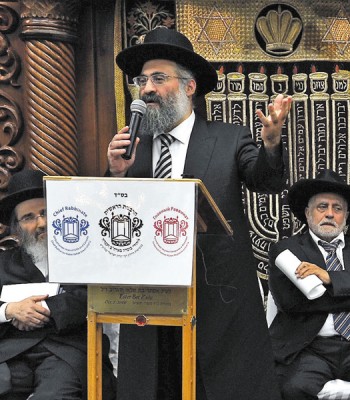
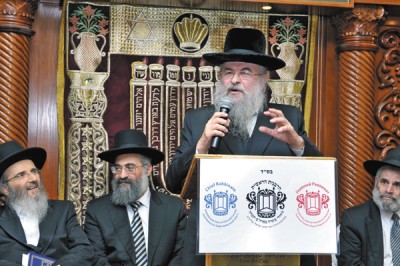
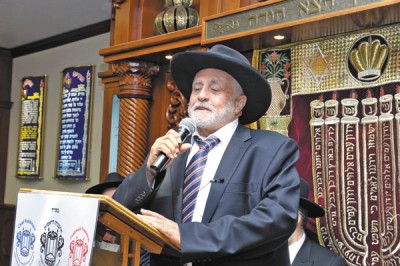
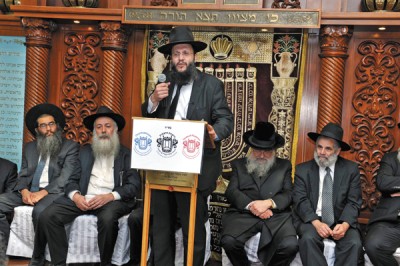
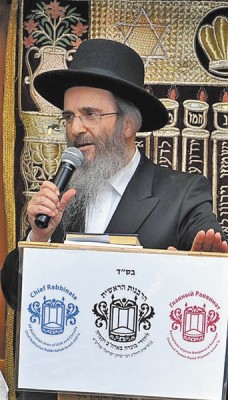
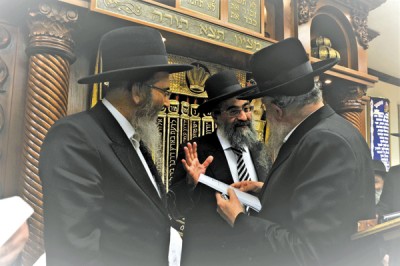
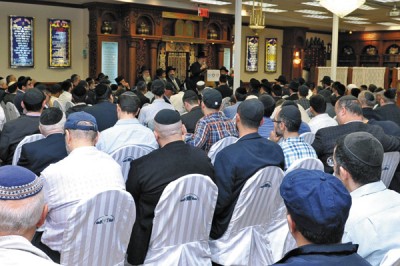
Chairs draped in white cloth, seats arranged to fill the room from front to back. The scene was unusual at the Beth Gavriel Center in Forest Hills last Sunday night, but then, so was the gathering. The event was labeled as “A Night of Unity in memory of the late Rabbi Ovadia Yosef.” Though the title of “Unity” is especially apropos to his memory, it also reflected the mood in the room.
This special event, presented by the Chief Bukharian Rabbinate, attracted people of all age groups and from all walks of life, including dozens of rabbis from our community and beyond. The richly varied guests complimented the aura surrounding the night’s speakers. At the podium were the esteemed Chief Rabbi of Bukharian-American Jewry, Rav Yitzchak Yisraeli; the famed Rav Igal Haimoff of Cong. Ohel Simcha; the esteemed posek Rav Noach Isaac Oelbaum of Cong. Nachlas Yitzchok; and the Av Bet Din of Queens, Harav Eliyahu Ben-Haim. It is impressive beyond words to actually witness a gathering so appropriately celebrating the life and times of Rav Ovadia Yosef.
Rabbi Ilan Meirov of Chazaq was given the honor of opening the event. He began by portraying Rav Ovadia, the giant of our time, as one who excelled both in outreach of the far-off and innovative teaching of the scholarly. He stressed that this is what all rabbis should aspire for and that thankfully the Bukharian community has been blessed with Rav Ovadia's student, Chief Rabbi Yitzchak Yisraeli, to lead our community.
Rabbi Meirov then called upon Rabbi Lior Dahan to offer words of inspiration. He spoke poetically of how Rav Ovadia was a man with a simple yet piercing vision: He had the distinctly well-defined goal of unifying his Sephardic brethren against all odds and across seemingly untraversable distances. His generation faced an unprecedented degree of division, both intellectually and physically. A telling occurrence demonstrates his underlying creed. Rav Ovadia once met King Juan Carlos of Spain, who asked him how he could categorize all Eastern Jews as Sephardi if they originated from vastly different countries. Rav Ovadia answered in consonance with his characteristic conviction that we define ourselves not by our place of origin, but by the unifying tradition of our halachah (legal code). Four years after his passing, it becomes clearer and clearer how truly successful he was in reestablishing a centralized halachic code for Sephardic and Eastern Jews.
The next speaker to take to the podium was Rabbi Noach Isaac Oelbaum. With his trademark brilliant flare, Rabbi Oelbaum brought fresh perspective to the distinctive trait of all great Jewish leaders. Haham Ovadia was known for his exceptional mastery of the Torah. However, he was also tremendous in another regard: He was a superior leader of his people, in every sense of the word. His actions demonstrated to us how a true leader stands fearless and determined in the face of all opposition. He draws strength and is fortified by G-d who determines one’s true effort. This was Maran Haham Ovadia Yosef. Unafraid of any man or group of men, he stuck to the truth without regard for political correctness or popular opinion. Yet with typical contrariety, he exuded a certain humility that distinguishes those whose sole objective is the dissemination of the Holy Torah. The Torah commands Jewish kings to write two personal Torah scrolls, one for humility and one for pride. Rav Ovadia was humble in the face of his task and also commanded absolute authority when performing his objectives. That is the definition of a king, a leader.
The next to speak was Rabbi Eliyahu Ben-Haim. He was a personal acquaintance of Maran Ovadia, having attended his classes in the 1960s, and painted a vibrant image of the man behind the name. Ask any Israeli today and without dispute you will be told that Maran Ovadia single-handedly changed the status of Sephardim in the Holy Land. He uplifted Sephardic Jewry and cared for their Torah - truly cared. His devotion poured forth in loving toil; a light in his study room was always seen in house until 2 or 3 a.m. He worked very hard and absorbed the Torah with fiery love and devotion. Love of the Torah meant that he learned every spare minute - on the bus with one hand holding a book and the other holding him steady. Stories abound about his utter dedication and an unquenchable thirst for G-d’s word. When we remember this man and his accomplishments, we would do well to also remember his love for life itself and emulate his desire for Divinity.
Rabbi Igal Haimoff spoke next and touchingly shared some warm memories of Maran Ovadia. He related how Maran once made his way from Jerusalem to Tel-Aviv to attend Rav Haimoff’s grandmother’s funeral. Her late husband was a friend of his youth. Another time, he offered to clean a bookseller’s store nightly in exchange for the opportunity to study there for the remainder of the night. Maran’s son once related how his father would stop on the street and bring errant young boys to his house and rehabilitate them. He also famously split his time for students of all levels. Selflessness, humility, and love for his people -traits these defined Maran. These characteristics also explain the following story as well.
Rav Haimoff’s grandfather often studied at Rav Ezra Attiah’s yeshiva at the same time Maran Ovadia would attend. When the young Rav Ovadia would walk in, Rav Attiah, the elderly Rosh Yeshiva, would stand. When the students asked the legendary Rav Attiah why he stood, he would simply answer, “A living Torah scroll has entered the room.” Rav Ovadia did not just study the Torah; he lived it.
The final speaker of the night was Rabbi Yitzchak Yisraeli. He gave a glimpse into the inner world of Maran through his own experience as a student. Rav Ovadia's life goal was to join all Sephardic Jewry under a banner of pure Torah. But how do you go about such a task? Maran would teach us that a leader must learn behavior from two kinds of trees. At times he must be like the cedar tree, strong and tall, while other times like a palm tree, producing sweet fruit that delights the palate. Rabbi Yisraeli recalled for the crowd how Maran gave high-level discourses in closed forums. He would give class for two hours straight and in those hours orbit complete legal doctrines. He would draw students’ attention by sheer force of his enormous mental rigor. Even though his classes were often longer than two hours, the students were hesitant to break. He truly was like a palm tree producing “honey” for his students. Yet when he needed to project ideas and make legal points, he did so with the full gamut of his office. Maran demonstrated a pride belonging to the absolute and unyielding authority of the great cedar tree.
With all this, Maran never lost his humanity. There was once an occurrence where an individual who was a vocal detractor of Maran needed his help to secure a two million dollar grant for his yeshiva. Maran helped without blinking an eye, even though those around him pressured him not to help a man who would make a point of talking negative about him. Another time, Maran had guests on Pesach who were friends of his young son. When he heard that they were of Ashkenazi descent, he called his son into the side room and instructed him to remove all kitniyot (grains which Ashkenazim avoid on Pesach) from the table. The boys were young but Maran cared about even their feelings and wanted them to feel comfortable.
The Unity Event ended on a very high note. Though we lost one of the greatest leaders of our generation a few years ago, we left with the knowledge of what made Maran Ovadia so special. Fearlessness, devotion, hard work, and erudition were all part of his make-up. On a personal note, it is comforting to know that his students, such as Rav Yitzchak Yisraeli, continue to toil in his mission. Though we may have lost an irreplaceable father of the Jewish people, we can take some comfort in the legacy he left with his many students. May we all merit to welcome him again with the unity and brotherhood that he made his life goal.
Chief Bukharian Rabbinate Holds Night Of Unity In Memory Of Maran Rav Ovadia Yosef
Typography
- Smaller Small Medium Big Bigger
- Default Helvetica Segoe Georgia Times
- Reading Mode


